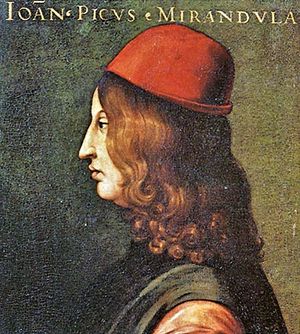Giovanni Pico Della Mirandola
 From Conservapedia
From Conservapedia Giovanni Pico della Mirandola (1463-1494) was an Italian polymath. He is considered the most influential Renaissance Neo-Platonist. Pico also is one of the first thinkers to consider the capacity of freedom to be hallmark of being human. He developed a philosophy known as syncretism.
In 1486 Pico drew up a list of nine hundred true theses (or propositions), using various Greek, Arabic, Hebrew, and Roman thinkers who summarized his views. He invited scholars from all over Europe to come to Rome, where he would defend his positions against all challengers. [1]
- I have read in the records of the Arabians, reverend Fathers, that Abdala the Saracen, when questioned as to what on this stage of the world, as it were, could be seen most worthy of wonder, replied: "There is nothing to be seen more wonderful than man." In agreement with this opinion is the saying of Hermes Trismegistus: "A great miracle, Asclepius, is man." Oration on the Dignity of Man
- Human vocation is a mystical vocation that has to be realized following a three stage way, which comprehends necessarily moral transformation, intellectual research and final perfection in the identity with the absolute reality. This paradigm is universal, because it can be retraced in every tradition. (Ibidem)
Books[edit]
- Heptaplus.
- Oration on the Dignity of Man.
- Conclusiones philosophicae, cabalisticae et theologicae.
- Apologia J. Pici Mirandolani, Concordiae comitis.
- Disputationes adversus astrologiam divinatricem.
- De ente et uno.
- Aureae ad familiares epistolae (letters)
See also[edit]
External links[edit]
- Giovanni Pico della Mirandola Catholic Encyclopedia.
- The Renaissance: Studies in Art and Poetry
Categories: [Philosophers] [Renaissance]
↧ Download as ZWI file | Last modified: 03/01/2023 00:22:48 | 10 views
☰ Source: https://www.conservapedia.com/Giovanni_Pico_della_Mirandola | License: CC BY-SA 3.0
 ZWI signed:
ZWI signed:
 KSF
KSF